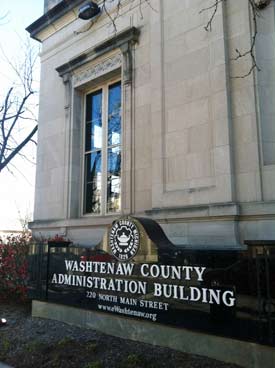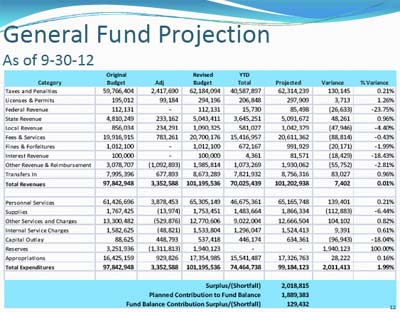County Floats Contract with Humane Society
On Nov. 7, the Washtenaw County board of commissioners will be dealing with several items related to the 2013 budget, including a much-anticipated proposal for handling animal control services.

The meetings of the Washtenaw County board of commissioners are held at the county administration building at the corner of Main and Catherine in Ann Arbor.
County administrator Verna McDaniel is bringing forward a resolution for a contract with the Humane Society of Huron Valley for $500,000 annually – the same amount that HSHV was paid in 2011, before a controversial decision to cut funding for animal control services. HSHV’s current contract with the county, which expires on Dec. 31, is for $415,000. Originally, the county had planned to cut funding for mandated animal control services to $250,000 annually for 2012 and 2013.
If approved, the resolution would authorize a contract with HSHV for up to four years, and would direct McDaniel to seek separate contracts with other local governments to offset the county’s costs. According to a staff memo, five municipalities with their own animal control ordinances – the cities of Ann Arbor and Ypsilanti, Ypsilanti Township, Pittsfield Township, and Superior Township – have made preliminary commitments to help fund those services.
The new contract with HSHV would require a revision to the budget – one of several budget adjustments that are proposed for 2013. The county works on a two-year planning cycle, but must approve its budget annually. In late 2011, commissioners approved budgets for 2012 and 2013. On Nov. 7, the board will be asked to “reaffirm” the 2013 general fund budget, with revisions that bring revenues and expenditures to $102.84 million. Commissioners will also receive a third-quarter budget update for 2012.
It’s possible that commissioners will make additional amendments to the 2013 budget at the meeting. For example, the agenda includes a placeholder item related to commissioner compensation. [See Chronicle coverage: "Compensation Change for County Board?"]
A public hearing on the 2013 budget is set for the board’s final meeting of the year, on Dec. 5. Commissioners are expected to take a final vote on the budget at that meeting.
Commissioners are also planning a caucus immediately prior to their Nov. 7 meeting, starting at 5:30 p.m., to discuss nominations to various county boards, commissions and committees. Those appointments are expected to be voted on at the board meeting later that evening.
Animal Control Services
In action related to how the county handles mandated and non-mandated animal control services, the board will consider a resolution authorizing a contract with the Humane Society of Huron Valley for $500,000 annually. If approved, it would allow the administration to contract with HSHV for up to four years, with the option of adjusting the contract for inflation.
The county would not likely pay that entire amount, however. According to a staff memo accompanying the Nov. 7 resolution, county administrator Verna McDaniel has received preliminary commitments from five municipalities that have their own animal control ordinances, and that have agreed to help the offset the cost of the HSHV contract. Those entities are the cities of Ann Arbor and Ypsilanti, Ypsilanti Township, Pittsfield Township, and Superior Township. The memo states that those local governments have agreed to execute contracts with the county to provide funding for animal control services. The Nov. 7 resolution would authorize McDaniel to finalize contracts with each of these local entities.
The $500,000 amount had been the level that the county paid HSHV in 2011. But late last year, the county proposed cutting that amount to $250,000 in both 2012 and 2013. Following protests by HSHV and its supporters, who argued that even $500,000 wasn’t sufficient to cover their costs, the county ultimately agreed to pay HSHV $415,000 in 2012. As part of that agreement, an effort began to develop a new policy for animal control services. [.pdf of policy task force report] The board also formed a work group, led by Sheriff Jerry Clayton, to analyze costs for services that HSHV provides. As part of that process, commissioners contemplated issuing a request for proposals (RFP) to solicit other entities that could provide animal control services. [For recent Chronicle coverage, see: “Task Force: Negotiate with Humane Society.”]
On Sept. 19, 2012, the board passed a resolution directing county administrator Verna McDaniel to start negotiations with HSHV on a new contract. The resolution also stated that if McDaniel didn’t believe sufficient progress was being made by the end of October, then she was authorized to issue an RFP to seek bids from other organizations.
At their Oct. 3 meeting, commissioners approved a set of recommendations to guide McDaniel in her negotiations. The service recommendations described in the Oct. 3 resolution include: (1) licensing all dogs at the point of adoption or recovery; (2) holding all stray animals for only the minimum number of days required by state law; (3) providing animal cruelty investigations; (4) holding animals for bite quarantine or other court-mandated reasons for the minimum time required by state law; (5) specifying by contract the required holding period, medical attention and basic humane care for animals; (6) posting information on the county website regarding animals that are available for adoption or recovery; (7) supporting county policies for registration and licensing of animals; and (8) establishing a monthly report for the county board of commissioners regarding animal control operating metrics.
And in a move that’s also related to animal control services, the board gave initial approval on Oct. 17 to a civil infractions ordinance, giving the county more flexibility to designate violations of other county ordinances as a civil infraction, rather than a criminal misdemeanor. [.pdf of proposed ordinance]
In the context of animal control, enforcement of the county’s dog licensing ordinance is low because the current penalty – a criminal misdemeanor of 90 days in jail or a $500 fine – is relatively harsh. The idea is that enforcement would improve if a lesser civil infraction could be used. The proposed fines would be $50 for a first offense, $100 for a second offense, and $500 for a third or any subsequent offense. An increase in dog licenses would provide additional revenue to be used for animal control services.
The civil infractions ordinance is on the Nov. 7 agenda for final approval. A public hearing on the item is scheduled for the same meeting.
2013 Revised Budget
The county works on a two-year budget planning cycle. In late 2011, commissioners set the budget for 2012 and 2013. However, state law mandates that the board must approve the budget annually. So on Nov. 7, a resolution is on the agenda to give initial approval to the budget “reaffirmation” for 2013, including several proposed adjustments. It’s also possible that commissioners will make additional amendments from the floor on Nov. 7. A final vote and public hearing on the 2013 budget will be held on Dec. 5 – the board’s last meeting of 2012. [.pdf of proposed 2013 budget]
A year ago, the 2013 budget was set at $97.066 million. Now, the 2013 budget proposed by the administration is $102.84 million – $5.774 million higher in both revenues and expenditures. Property taxes typically account for about 63% of revenues, and the general fund budget is based on an operating millage rate of 4.5493 mills. Because property values have not decreased as much as originally anticipated, the county expects about $2.4 million more in property tax revenues for 2013 than it had previously accounted for in the 2013 budget. The budget assumes that property tax revenues will be 2% lower than in 2012.
Among the other revenue sources expected in 2013 are the state revenue sharing/county incentive program ($2.7 million), and state convention facility/liquor tax funding.
Also on the revenue side, the 2013 budget includes a planned use of $3.287 million from the fund balance. Of that, about $2 million is estimated to be carried over from a budget surplus in 2012. Previously, the county had expected to use $1.8 million more than that from the fund balance in 2013 – for a total $3.8 million. The fund balance is expected to be $16.54 million at the end of 2012, and would drop to $13.257 million in 2013.
The 2013 budget proposes a net increase of one full-time-equivalent (FTE) position – eight jobs are being created, and seven will be eliminated, including two county commissioner positions. [The commissioners are considered part-time positions for purposes of providing health insurance coverage and other benefits, but are included in this count as full-time positions.] Two additional jobs will be placed on “hold vacant” status.
The largest expenditures relate to personnel, which accounts for 66% of general fund expenses. The proposed 2013 budget shows a $4.7 million increase in that category, compared to the original 2013 budget that commissioners approved in 2011. According to a staff memo, those additional costs relate to increases in fringe benefits, medical costs, and a higher number retirees than expected. There were 118 retirements in 2011, which added to pension costs.
As part of information provided in the Nov. 7 board packet, a 52-page document is included that gives details about the expenditures and FTEs associated with mandated and discretionary county services, including the number of employees used to provide those services. [.pdf of mandated/discretionary services document]
2012 Third-Quarter Budget Update
Another budget-related item on the Nov. 7 agenda is a financial update on the third quarter of 2012 – the period from July 1 through Sept. 30. The most recent previous update – for the first six months of the year – was delivered at the board’s Aug. 1 meeting.
Next regular board meeting: Wednesday, Nov. 7, 2012 at 6:30 p.m. at the county administration building, 220 N. Main St. in Ann Arbor. The ways & means committee meets first, followed immediately by the regular board meeting. [Check Chronicle event listings to confirm date] (Though the agenda states that the regular board meeting begins at 6:45 p.m., it usually starts much later – times vary depending on what’s on the agenda.) Public commentary is held at the beginning of each meeting, and no advance sign-up is required.
The Chronicle could not survive without regular voluntary subscriptions to support our coverage of public bodies like the Washtenaw County board of commissioners. Click this link for details: Subscribe to The Chronicle. And if you’re already supporting us, please encourage your friends, neighbors and colleagues to help support The Chronicle, too!





We had issues with a neighborhood pit bull left repeatedly unleashed and that allegedly threatened visitors and children of nearby homes. The dog was not vaccinated nor licensed and took much work on the part of our Neighborhood Association due to Animal Control staffing cutbacks on the police departments. I am relieved to hear there is something being done to address this.
Those fines are not that severe if you consider what the victim has to endure receiving rabies vaccinations for an unvaccinated dog bite, regardless of if it whether or not it was aggressive.